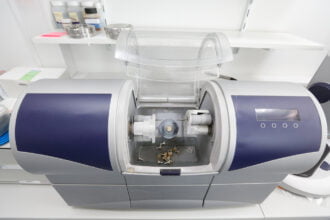While the side effects can appear at any age, the older we get, the more prone our skin becomes to wrinkles, dullness, and dark spots. Having perfect skincare in your younger years could help prevent some of these side effects. Unfortunately, many of us don’t realize the dangers of not caring for our skin until it’s too late.
Luckily, while you can’t reverse old damage, there is plenty you can do to treat the signs of aging and get back your beautiful, radiant skin. If you’re suffering from dry, dull, or wrinkled skin, keeping reading to learn three top tips for caring for your aging skin.
1. Upgrade Your SPF
Sun damage is one of the leading causes of unwanted changes to our skin. Because it can take years to show, sun damage sustained in our 20s and 30s may begin to rapidly age our skin in our 40s and 50s, if not earlier.
While you can’t go back and reverse sun damage sustained in your youth, you can take measures to prevent further damage. Regardless of your age, wearing sunscreen every day, whether you plan to spend a long time outdoors or not, is a must. But if you aren’t using the right sunscreen, you may not be doing enough to prevent damage.
Opt for a sunscreen with a minimum of 30 SPF. If you are prone to dry skin or dull skin, you should also choose a sunscreen that moisturizes while protecting your skin.
2. Rethink Your Routine
Our skin has vastly different needs and characteristics at different points in our lives. For men and women alike, the teenage years often bring oily skin and acne breakouts. In our 20s, if we’re lucky, our skin bounces back quickly, even if we don’t take care of it. By our 30s, the effects of poor skincare and a bad diet begin to catch up, and wrinkles and dark spots may begin to make themselves known.
Dry skin is another symptom that may come and go at various points in our lives. Dry skin in your teens and 20s is often the result of a skincare routine designed to treat oily skin. But as we age, dry, dull skin is more often the result of less natural oil production.
As our skin changes, so should our skincare. If you’re still relying on the products that once helped you fight acne or oily skin, it’s time to rethink your routine. Look for products made with anti-aging ingredients to fight all of the side effects our skin experiences as we age, including dry skin, wrinkles, loss of firmness, and more.
3. Hydrate from the Inside Out
Sun damage, slowed cell renewal, and less natural oil production as we age all add up to one big side effect: dry skin. Upgrading to a stronger sunscreen designed to moisturize while protecting from UV rays and following a moisturizing skincare routine can help with this. But the best way to keep your skin healthy and happy is to hydrate from the inside out.
Increasing your water intake can help give you glowing, hydrated skin. Aim to drink at least eight glasses of water each day. Like most skincare tips, this isn’t an overnight-fix. However, stick with it and you’ll notice a difference not just in your skin, but also in your energy levels, hair, and other parts of your body that benefit from good hydration.
Caring for Aging Skin
It’s impossible to go back in time to change the poor habits that led to wrinkles, sun damage, and dull skin. But it’s isn’t too late to treat the signs of aging and get beautiful, healthy skin at any age. By hydrating from the inside out, upgrading your SPF, and rethinking your skincare routine, you can treat the signs of aging and prevent more from appearing.









